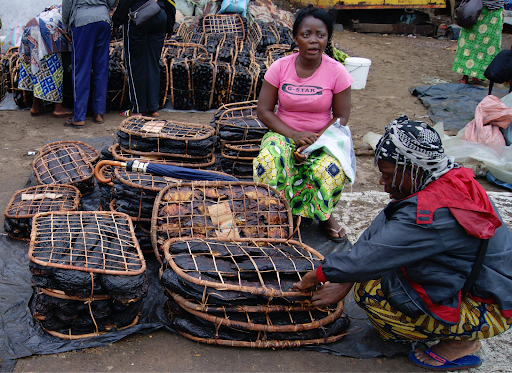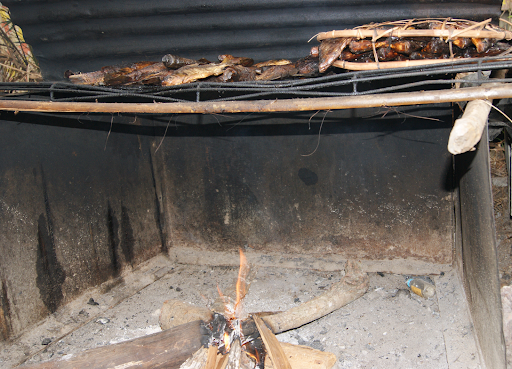Smoked Catfish from Tradition to Export – In 2016, Vietnam’s catfish alone were exported to 137 countries and districts in the world.
At the same time, emerging companies from the African continent are entering into the international fish processing, smoked fish production, and export business.
The Opportunity is Ripe
There is already a large market for catfish in Asia and a growing one in Western countries like the United States and Canada where a lot of consumers are moving away from red meat and beginning to look for alternative protein sources. There are also lots of Africans working and living in the United States, and with catfish’s relative status in traditional diets, it is popular in both markets and restaurants.
Catfish are not only high in important nutrients such as Vitamin D and omega-3 fatty acids, but they are also easy to prepare because they have a simple physical structure without scales and bones. In addition, in Africa, catfish can be farmed year-round with high growth performance and simple farming practices and structure. Overall, catfish farming has been identified as a priority sector for agricultural development in many African countries due to their potential ability to provide a sustainable source of protein and income for smallholder farmers.

The Tradition is There
The African catfish species (Clarias gariepinus) has an almost Pan-African distribution. They are typically farmed in ponds as well as in offshore cages in lakes or dams. Nigeria is the leading producer of catfish in Africa, followed by Ghana, Egypt, and Uganda. In Nigeria, Clarias gariepinus is one of the most popular fish species, has high commercial value, and once smoked, is a special delicacy in average and rich homes in the country.
Catfish is traditionally consumed after being smoked for both practical and culinary reasons. Through smoking, the catfish takes on a delightful golden hue, an intense flavor, and a chewy yet tender texture. Smoking the catfish reduces its odor and helps to preserve it, allowing it to have a wider distribution and reach more remote areas. Crucially, smoking adds value, making smoked catfish more profitable than its fresh counterpart. For example, in Oyo, the largest river trading hub in the Republic of Congo, the smoked product is worth five times more than when it is fresh. When the weight loss of about 50 %, the cost of labor, and the cost of wood is considered, the product still doubles its value or more through the smoking process.

So What’s the Problem?
Although using traditional wood smoke methods adds a unique flavor to the catfish, it also often involves burning a massive amount of wood, which leads to a variety of problems. For one, an exorbitant amount of CO2 is produced, resulting in kilns releasing more greenhouse gas pollution than they should. Also, traditional smoking releases contaminants known as polycyclic aromatic hydrocarbons (PAHs), which are carcinogenic and hazardous to the human respiratory system. Traditional wood smoking also prevents Nigerian catfish producers from accessing the international export market, because very few countries will allow catfish on the market that has been dried directly over fire.

There are also sanitary and hygienic problems with traditional products that are related to the cold chain and hygienic standards during processing, stocking, and transport. Furthermore, it is extremely difficult to get bank financing for projects for smallholder farmers. Of course, climate change has to put in a word too: struggling fish populations require adaptive research, sector-specific knowledge, skills, and technology, leaving business-as-usual farmers behind.
A New Approach
To address these problems, new and sustainable projects are needed that include social, economic and environmental aspects. For example, there is an innovative fish smoking approach that is based on the use of fish smoking machines. These machines have the potential to reduce the carbon footprint of the smoking process, smoke products more efficiently, and open up the product to an international market that does not accept traditionally smoked products. Using this technology, Femi Eniola of the Nigerian Osky Catfish Hatchery Grow-out & Processing Facility was able to set up a successful catfish business and says that if done right, catfish farming can be a lucrative business.

This new system works by allowing cold smoke to be generated directly in the integrated burner, which is cooled by a fan. For hot smoking, it is then sufficient to switch on the electric heaters in the oven to heat the chamber. Smoking is done by slowly combusting chips or flours from different types of wood (also by-products of local wood processing and agriculture), to which special plants may be added for flavoring. The smoke, a product of the slow and incomplete combustion of the wood, and taking into account the absence of flame and low-oxygen atmosphere, spreads aromas and imbues the food with a particular taste and flavoring, as well as preserving the fish and adding to its value.







